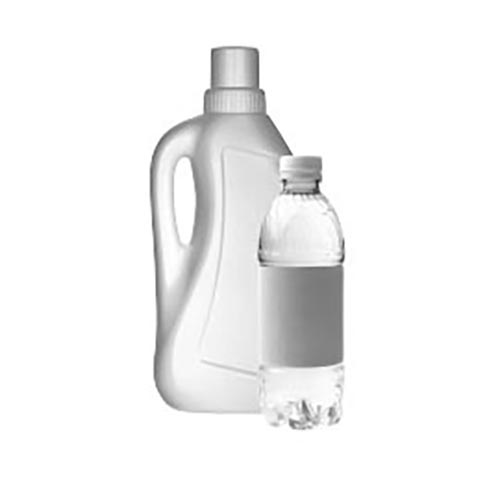
Plastic Bottles and Jugs
Only plastic bottles and jugs belong in your curbside recycling. Plastic bottles and jugs should be empty, clean and dry. Replace the cap, place in recycling.
In Cuyahoga County, all communities can include plastic bottles or jugs in curbside recycling. Plastic bottles and jugs must be empty, clean and dry before being recycled.
Plastic bottles and jugs include items like water and soda bottles, shampoo bottles, over-the-counter (OTC) vitamin and self-care product bottles, milk, water and juice jugs, laundry detergent jugs, bleach bottles, and mayonnaise or peanut butter jars. Think containers with a “neck” and larger than 2" in diameter. Bottles and jugs should be emptied and rinsed. Replace the cap and put in your curbside recycling.
Spray nozzles or pumps should be removed and placed in the trash. Containers that held hazardous materials (motor oil, pesticides) may have residue and should be placed in the trash, not recycling, for proper disposal.
Some local recycling processors can also recycle plastic tubs (eg., butter, sour cream, fruit and yogurt cups). Depending on which processor your community contracts with, you may be able to include tubs in your curbside recycling.
Information about managing Rx or prescription medication bottles can be found on our medications page.
What about those numbers on plastic containers? Does that mean the container is recyclable?
The numbers on plastic containers are resin codes used by the plastics industry to identify the type of resin used to make the container. All plastic containers have a code but that does not mean the item is recyclable. To determine recyclability, consider the shape of the container instead of checking its number. Plastic bottles and jugs can be recycled if it has a neck or an opening narrower than the body.
Earth911 explains the difference between PET plastic bottles and PET plastic clamshells.
NPR published a project in 2019 that helps explain plastics recycling.
What happens if I put the wrong plastics in my curbside recycling? Can I just throw in any plastic that I want and let the recycler deal with it?
If you put the wrong plastics in your curbside recycling, they will not be recycled. Instead, they will have to be sorted and landfilled, which increases the cost of recycling which is paid by your community, and ultimately, you.
Bottles and jugs should be empty, clean and dry before recycling. For peanut butter jars, scrape remnants out with a small spatula if necessary. See our blog post about preparing your recyclables for collection.
Plastic clamshells, takeout containers, utensils, bakery trays and plastic blister packaging should be placed in the trash. See details.
Why can’t all plastics be recycled?
There is an abundance of plastic packaging in our society today and only about 9% of it can currently be recycled. This is due to limited markets for recycled plastic (not all manufacturers produce packaging from recycled plastic) and the complexities of sorting the various kinds of plastic.
Until there is a major shift in the demand for recycled plastic and more sensible packaging design, consumers are limited in our recycling options. Consider these ideas for reducing waste.
What about plastic from a business?
Businesses can recycle industrial plastics through local specialized companies. For business locations, see the list of options below.
---
Looking to recycle, donate or dispose of other items? Use the dark blue 'What Do I Do With?' search bar at the top of every page of this website. Allow location services or use the city drop-down to find opportunities in your local area.
